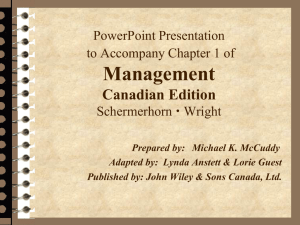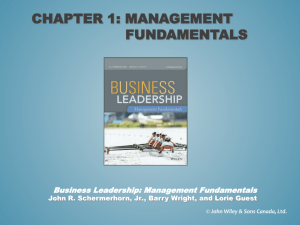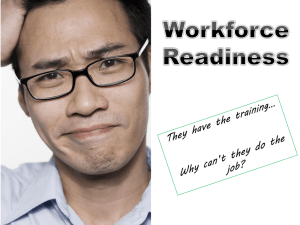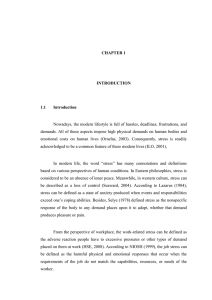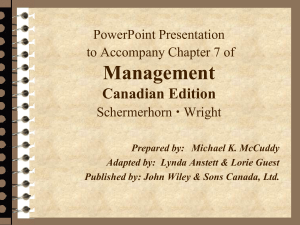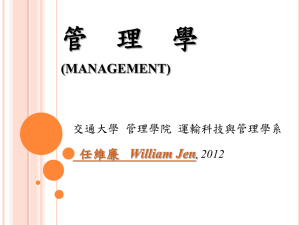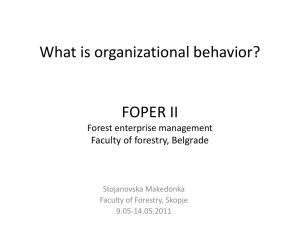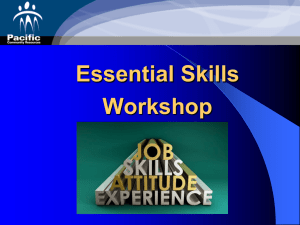File - student business information
advertisement
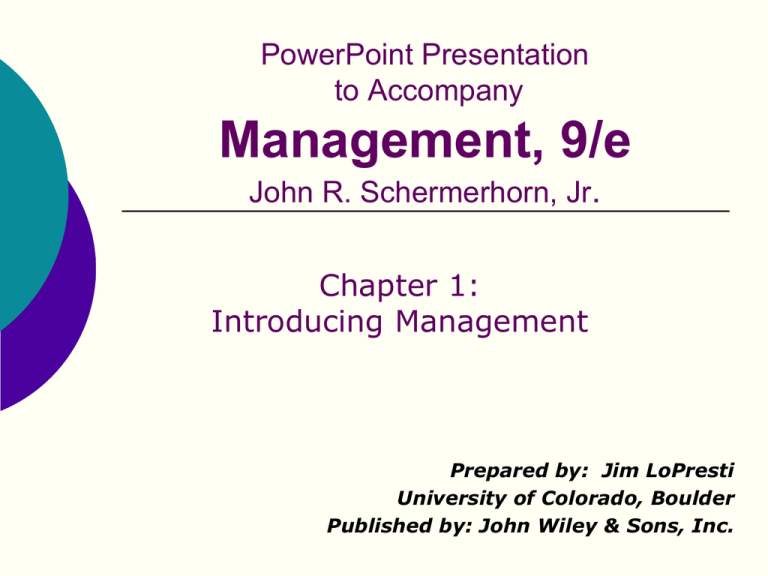
PowerPoint Presentation to Accompany Management, 9/e John R. Schermerhorn, Jr. Chapter 1: Introducing Management Prepared by: Jim LoPresti University of Colorado, Boulder Published by: John Wiley & Sons, Inc. Study Question 1: What are the challenges of working in the new economy? Intellectual capital … People are the the ultimate foundations of organizational performance. Intellectual capital is the collective brainpower or shared knowledge of a workforce that can be used to create value. A knowledge worker adds to the intellectual capital of an organization. Management 9/e - Chapter 1 2 Study Question 1: What are the challenges of working in the new economy? Globalization … National boundaries of world business have largely disappeared. Globalization is the worldwide interdependence of resource flows, product markets, and business competition that characterize the new economy. Management 9/e - Chapter 1 3 Study Question 1: What are the challenges of working in the new economy? Technology … Continuing transformation of the modern workplace through: The Internet World Wide Web Computer networking Information technology Telecommuting/virtual teaming Increasing demand for knowledge workers with the skills to fully use technology. Management 9/e - Chapter 1 4 Study Question 1: What are the challenges of working in the new economy? Diversity … Workforce diversity reflects differences with respect to gender, age, race, ethnicity, religion, sexual orientation, and able-bodiedness. A diverse and multicultural workforce both challenges and offers opportunities to employers. Management 9/e - Chapter 1 5 Study Question 1: What are the challenges of working in the new economy? How diversity bias can occur in the workplace: Prejudice Discrimination Glass ceiling effect Management 9/e - Chapter 1 6 Study Question 1: What are the challenges of working in the new economy? Ethics Code of moral principles that set standards of conduct. Ethical expectations for modern businesses: Integrity and ethical leadership Natural environment Consumer protection Human rights Management 9/e - Chapter 1 7 Study Question 1: What are the challenges of working in the new economy? Corporate governance Active oversight of management decisions and company actions by board of directors. More emphasis today on restoring strength of corporate governance: Enron, WorldCom, Arthur Anderson failures Boards to hold management more accountable for ethical and socially responsible behavior Management 9/e - Chapter 1 8 Study Question 1: What are the challenges of working in the new economy? Careers … Core workers, contract workers, and part-time workers. People must be prepared to be any one of these types of workers. People must make sure that their skills are portable and of current value in employment markets. Management 9/e - Chapter 1 9 Study Question 2: What are organizations like in the new workplace? Critical skills for success in the new workplace … Mastery Contacts Entrepreneurship Love of technology Marketing Passion for renewal Management 9/e - Chapter 1 10 Study Question 2: What are organizations like in the new workplace? Organizations are open systems Composed of interrelated parts that function together to achieve a common purpose. Interact with their environments. Transform resource inputs into product outputs (goods and services). Environmental feedback tells organization how well it is meeting the needs of customers and society. Management 9/e - Chapter 1 11 Figure 1.1 Organizations as open systems. Management 9/e - Chapter 1 12 Study Question 2: What are organizations like in the new workplace? Organizational performance “Value creation” is a very important notion for organizations. Value is created when an organization’s operations adds value to the original cost of resource inputs. When value creation occurs: Businesses earn a profit. Nonprofit organizations add wealth to society. Management 9/e - Chapter 1 13 Study Question 2: What are organizations like in the new workplace? Organizational performance Productivity Performance effectiveness An overall measure of the quantity and quality of work performance with resource utilization taken into account. An output measure of task or goal accomplishment. Performance efficiency An input measure of the resource costs associated with goal accomplishment. Management 9/e - Chapter 1 14 Study Question 2: What are organizations like in the new workplace? Workplace changes that provide a context for studying management … Belief in human capital Demise of “command-and-control” Emphasis on teamwork Preeminence of technology Embrace of networking New workforce expectations Concern for work-life balance Focus on speed Management 9/e - Chapter 1 15 Study Question 3: Who are managers and what do they do? Importance of human resources and managers … People are not ‘costs to be controlled.’ High performing organizations treat people as valuable strategic assets. Managers must ensure that people are treated as strategic assets. Management 9/e - Chapter 1 16 Study Question 3: Who are managers and what do they do? A manager is a person in an organization who directly supports and helps activate the work efforts and performance accomplishments of others. The people who managers help are the ones whose tasks represent the real work of the organization. Management 9/e - Chapter 1 17 Study Question 3: Who are managers and what do they do? Levels of management Top managers — responsible for performance of an organization as a whole or for one of its larger parts. Middle managers — in charge of relatively large departments or divisions. Team leaders or supervisors — in charge of a small work group of non-managerial workers. Management 9/e - Chapter 1 18 Study Question 3: Who are managers and what do they do? Responsibilities of team leaders: Plan meetings and work schedules. Clarify goals and tasks, and gather ideas for improvement. Appraise performance and counsel team members. Recommend pay raises and new assignments. Recruit, develop, and train team members. Management 9/e - Chapter 1 19 Study Question 3: Who are managers and what do they do? Responsibilities of team leaders (cont.): Encourage high performance and teamwork. Inform team members about organizational goals and expectations. Inform higher levels of work unit needs and accomplishments. Coordinate with others teams and support the rest of the organization. Management 9/e - Chapter 1 20 Study Question 3: Who are managers and what do they do? Types of managers Line managers are responsible for work activities that directly affect organization’s outputs. Staff managers use technical expertise to advise and support the efforts of line workers. Functional managers are responsible for a single area of activity. General managers are responsible for more complex units that include many functional areas. Administrators work in public and nonprofit organizations. Management 9/e - Chapter 1 21 Study Question 3: Who are managers and what do they do? Managerial performance and accountability Accountability is the requirement of one person to answer to a higher authority for relevant performance results. Effective managers fulfill performance accountability by helping others to achieve high performance outcomes and experience satisfaction in their work. Management 9/e - Chapter 1 22 Study Question 3: Who are managers and what do they do? Quality of work life (QWL) An indicator of the overall quality of human experiences in the workplace. QWL indicators: Fair pay Safe working conditions Opportunities to learn and use new skills Room to grow and progress in a career Protection of individual rights Pride in work itself and in the organization Management 9/e - Chapter 1 23 Study Question 3: Who are managers and what do they do? High performing managers … Are well informed of their team’s needs. Work alongside those they supervise. Provide advice and develop support for their team. Help their people perform to the best of their abilities. Management 9/e - Chapter 1 24 Study Question 3: Who are managers and what do they do? The organization as an upside-down pyramid … Each individual is a value-added worker. A manager’s job is to support workers’ efforts. The best managers are known for helping and supporting. Management 9/e - Chapter 1 25 Figure 1.3 The organization viewed as an upsidedown pyramid. Management 9/e - Chapter 1 26 Figure 1.4 Four functions of management. Management 9/e - Chapter 1 27 Study Question 4: What is the management process? Functions of management … Planning The process of setting objectives and determining what actions should be taken to accomplish them. Organizing The process of assigning tasks, allocating resources, and arranging the coordinated activities of individuals and groups to implement plans. Management 9/e - Chapter 1 28 Study Question 4: What is the management process? Functions of management … Leading The process of arousing people’s enthusiasm to work hard and direct their efforts to fulfill plans and accomplish objectives. Controlling The process of measuring work performance, comparing results to objectives, and taking corrective action as needed. Management 9/e - Chapter 1 29 Figure 1.5 Mintzberg’s 10 Managerial Roles. Management 9/e - Chapter 1 30 Study Question 4: What is the management process? Managerial agendas and networks Agenda setting Development of action priorities for one’s job. Include goals and plans that span long and short time frames. Networking Process of building and maintaining positive relationships with people whose help may be needed to implement one’s work agendas. Management 9/e - Chapter 1 31 Study Question 5: How do you learn the essential managerial skills and competencies? Essential managerial skills Skill — the ability to translate knowledge into action that results in desired performance. Technical skill — the ability to apply a special proficiency or expertise to perform particular tasks. Human skill — the ability to work well in cooperation with others. Conceptual skill — the ability to think critically and analytically to solve complex problems. Management 9/e - Chapter 1 32 Figure 1.6 Katz’s Essential Managerial Skills. Management 9/e - Chapter 1 33 Study Question 5: How do you learn the essential managerial skills and competencies? Competencies for managerial success: Communication Teamwork Self-management Leadership Critical thinking Professionalism Management 9/e - Chapter 1 34

